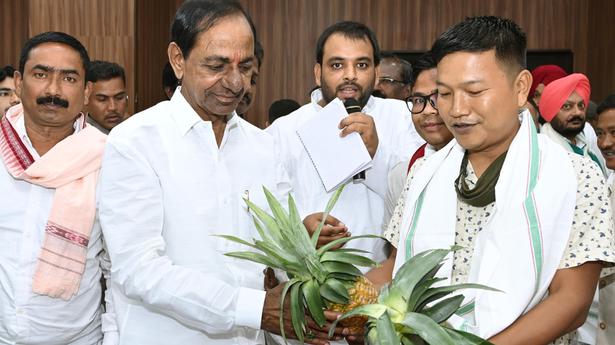
Joint platform of farmers at national level mooted
The Hindu
Irrigation potential not tapped totally, says Chief Minister
A day-long meeting of Chief Minister K. Chandrasekhar Rao with visiting leaders of farmers organisations from 26 States was unanimous that a joint forum of farmers at the national-level was needed to be set up to replicate the success story of Telangana in agriculture and pro-farmer policies.
Speakers at the meeting voiced the demand that the Telangana model in the sector was immediately required for the country, a release later said.
The meeting discussed in detail developments in agriculture at the national-level and condemned the anti-farmer policies of the Centre in crop cultivation and ensuring remunerative prices for farmers. Some senior leaders of farmers organisations who participated in the prolonged agitation against farm laws in the capital shared their views.
They appealed to Mr. Chandrasekhar Rao to take the lead in organising farmers who were otherwise unorganised across the country. Political leadership spared just five to ten minutes when it came to discussing the farmers issues. But, it was Mr. Rao alone who spent days to listen to the issues and try to resolve them.
They also said this was the first time a broad-based meeting dedicated to farmers issues took place in the country.
In his reply, Mr. Rao said it was unfortunate that administration was not on rails despite 75 years of Independence in the country. Mainly, solutions to the problems of farmers were eluding because the elected representatives in legislatures lacked sincerity. It was strange that the rulers set up hurdles to those who worked for the welfare of citizens. Therefore, it was time to unite forces which were willing to work for people.
The country had 40,000 crore acres of irrigable land and required 40,000 tmc ft water to grow crops. Another 10,000 tmc ft was required for drinking purpose. But, the country had 70,000 tmc ft water and yet people’s requirement water for irrigation and drinking was not met. The country also had the potential to generate four lakh MW of power but it did not even consume two lakh MW.

Andhra Pradesh CM Chandrababu Naidu inaugurates CNG, PNG projects in Rayalaseema region. Andhra Pradesh has the unique distinction of being the second largest producer of natural gas in India, thanks to the Krishna-Godavari (KG) Basin, he says, adding the State will lead the way towards net-zero economy.










